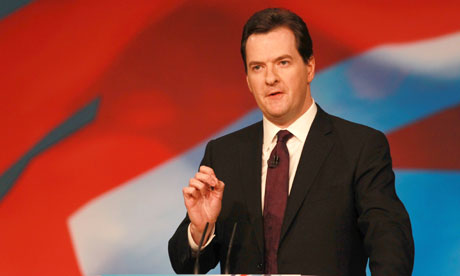Gas strategy should be 'plan Z', government's climate adviser warns
Chief executive of Committee on Climate Change says dash for gas is 'completely incompatible' with UK carbon targets

The gas strategy is due to be published alongside the chancellor’s autumn statement on Wednesday. Photograph: David Jones/PA
George Osborne's dash for gas is "completely incompatible" with the nation's legally binding carbon emissions targets and should be "plan Z", according to the government's official climate advisers.
The gas strategy, due to be published alongside the chancellor's autumn statement on Wednesday, envisages far more gas power stations than the limit recommended by the energy secretary, Ed Davey.
Osborne's strategy plans for as much as 37GW of new electricity capacity from gas-powered stations, equivalent to more than 40 new plants and half the UK's entire current electricity generating capacity.
This scenario "would not be economically sensible" and was "completely incompatible" with climate change targets, said David Kennedy, chief executive of the Committee on Climate Change, which is charged with charting the lowest cost, lowest risk path to a low carbon economy.
The strategy also includes a scenario for 26GW of new capacity, about 30 new plants, which Kennedy said was sensible. "The first scenario should be plan Z, the second plan A," he told the Guardian. "But including both scenarios in the strategy is damaging for investment in the energy sector. They are radically different paths and investors looking at this would say the government is giving no clear signal at all."
Kennedy had been selected as the new permanent secretary for the Department of Energy and Climate Change, until David Cameron personally intervened to block the appointment.
The chancellor believes a flexible gas strategy means UK businesses and energy bill payers could benefit if gas prices drop in future and he will reveal generous tax breaks for shale gas exploitation in Wednesday's statement.
Building 37GW would break a key 2025 carbon target, of which Osborne won a review in an earlier row over energy policy in 2011. However, even with fracking for shale gas, groups including the International Energy Agency and the CBI see no prospect of cheap gas in Europe.
Davey, currently at UN climate change talks in Doha, Qatar, told the Guardian that Osborne's gas strategy "is completely in line" with the government's carbon plan and carbon budgets. "We have always said that we will need extra gas capacity. We need up to 26GW of new capacity," he said.
Davey's limit of 26GW is significantly lower than Osborne's 37GW, but is significantly higher than the 20GW Davey recommended as recently as September.
Ben Caldecott, head of policy at investors Climate Change Capital, said that while some gas would be needed to balance higher levels of intermittent renewable energy, a heavy emphasis on gas - much of whichcurrently comes from Qatar - was risky.
"What we need is a more robust, future-proofed energy strategy, so that Britain can manage long term uncertainty and volatility. Going for gas in a big way fails this test, as it shields us from nothing, but exposes us to a wide range of risks that the UK has little or no control over," he said.
James Vaccaro, head of market and corporate development at Triodos Bank, said: "There are very clear economic benefits from supporting a low carbon future and why a 'dash for gas' approach could leave us all worse off before very long."
CBI director general, John Cridland, has urged the government to end the "gnarly mess" of its energy policy, saying doing so could add 0.5% to GDP and noting the 8% of GDP and near 1m jobs for which the green economy already accounts.
No hay comentarios:
Publicar un comentario